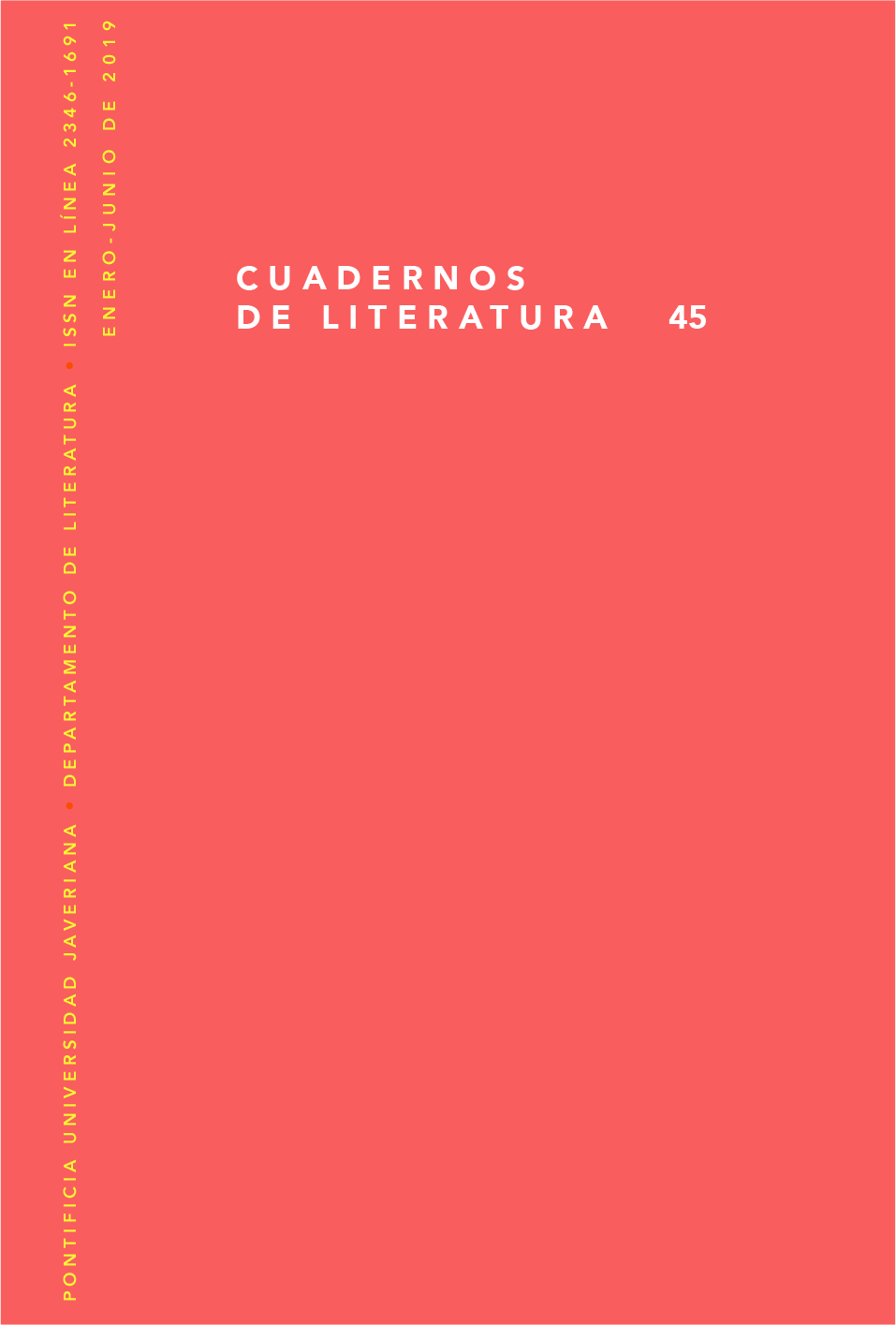Abstract
This work arises from the desire to contribute to the recognition of the countless and uninterrupted efforts made by Susana Rotker (Caracas, 1954 - Piscataway, 2000) to make Latin American chronicle more accessible to the readers interested in Latin American Studies and Literature, at the end of the 20th century. The study describes the context of the emergence of her work on Latin American chronicle, her research methods and practices (doubts, purposes, ways of analyzing and certainties reached), and the reception of her works. All this serves as a presentation to “Ciudades escritas por la violencia” (Cities written by violence), now edited by Cuadernos de Literatura. A work that manifests the author’s vital inclination to inquire and elucidate the citizen’s experiences (of violence) in Latin American contemporary genres like the journalistic and literary chronicle.
González, Aníbal. La crónica modernista hispanoamericana. Madrid: Ediciones José Porrúa Turanzas, 1983. Impreso.
Martínez, Tomás Eloy. “Una introducción”. La invención de la crónica por Susana Rotker. México: Fondo de Cultura Económica - Fundación para un Nuevo Periodismo, 2005. 9-10. Impreso.
Martínez, Tomás Eloy y Susana Rotker. “Oviedo y Baños: La fundación literaria de la nacionalidad venezolana”. Historia de la conquista y población de la Provincia de Venezuela. Ed. Tomás Eloy Martínez. Caracas: Fundación Biblioteca Ayacucho, 1992. IX-XLVIII. Impreso.
Pacheco, Carlos, Luis Barrera Linares y Beatriz González Stephan, coords. Nación y literatura. Itinerarios de la palabra escrita en la cultura venezolana. Caracas: Fundación Bigott - Banesco - Editorial Equinoccio, 2006. Impreso.
Ramos, Julio. Desencuentros de la modernidad en América Latina. Literatura y política en el siglo XIX. México: Fondo de Cultura Económica, 1989. Impreso.
Rotker, Susana, ed. Ciudadanías del miedo. Caracas: Nueva Sociedad - Rutgers. The State University of New Jersey, 2000. Impreso.
Rotker, Susana. “Ciudades escritas por la violencia”. Bravo pueblo. Poder, utopía y violencia. Caracas: Fondo Editorial La Nave Va, 2005. 175-196. Impreso.
Rotker, Susana. “Crónica y cultura urbana: Caracas, la última década”. Estudios. Revista de Investigaciones Literarias 1.1 (1993, enero-junio): 121-130. Impreso.
Rotker, Susana. “Crónica y cultura urbana: Caracas, la última década”. Inti: Revista de literatura hispánica 37-38 (1993, primavera): 233-242. https://digitalcommons.providence. edu/inti/vol1/iss37/27. Web. 11 de septiembre de 2018.
Rotker, Susana. Fundación de una escritura: las crónicas de José Martí. La Habana: Ediciones Casa de las Américas, 1992. Premio Casa de las América, mención Ensayo, 1991. Impreso.
Rotker, Susana. “La crónica. Género de fin de siglo”. Bravo pueblo. Poder, utopía y violencia. Caracas: Fondo Editorial La Nave Va, 2005. 165-176. Impreso.
Rotker, Susana. Isaac Chocrón y Elisa Lerner. Los transgresores de la literatura venezolana. (Reflexiones sobre la identidad judía). Caracas: Fundarte - Alcaldía del Municipio Libertador, 1991. Impreso.
Rotker, Susana. La invención de la crónica. México: Fondo de Cultura Económica - Fundación para un Nuevo Periodismo, 2005. Impreso.
Rotker, Susana. “Nosotros somos los otros”. Ciudadanías del miedo. Ed. Susana Rotker. Caracas: Nueva Sociedad - Rutgers. The State University of New Jersey, 2000. 217-229. Impreso.
Rotker, Susana. “Nosotros somos los otros”. Nación y literatura. Itinerarios de la palabra escrita en la cultura venezolana. Coords. Carlos Pacheco, Luis Barrera Linares y Beatriz González Stephan. Caracas: Fundación Bigott - Banesco - Editorial Equinoccio, 2006. 843-854. Impreso.
Vicente, Fernando. Ilustración, “57 libros admirables para entender la vida” por Carlos Geli. El País [España], 1 de abril de 2018. https://elpais.com/ cultura/2018/03/29/actualidad/1522342415_192894.html. Web. 1 de abril de 2018.
Cuadernos de Literatura is registered under a Creative Commons Attribution 4.0 International Public License. Thus, this work may be reproduced, distributed, and publicly shared in digital format, as long as the names of the authors and Pontificia Universidad Javeriana are acknowledged. Others are allowed to quote, adapt, transform, auto-archive, republish, and create based on this material, for any purpose (even commercial ones), provided the authorship is duly acknowledged, a link to the original work is provided, and it is specified if changes have been made. Pontificia Universidad Javeriana does not hold the rights of published works and the authors are solely responsible for the contents of their works; they keep the moral, intellectual, privacy, and publicity rights.
Approving the intervention of the work (review, copy-editing, translation, layout) and the following outreach, are granted through an use license and not through an assignment of rights. This means the journal and Pontificia Universidad Javeriana cannot be held responsible for any ethical malpractice by the authors. As a consequence of the protection granted by the use license, the journal is not required to publish recantations or modify information already published, unless the errata stems from the editorial management process. Publishing contents in this journal does not generate royalties for contributors.


